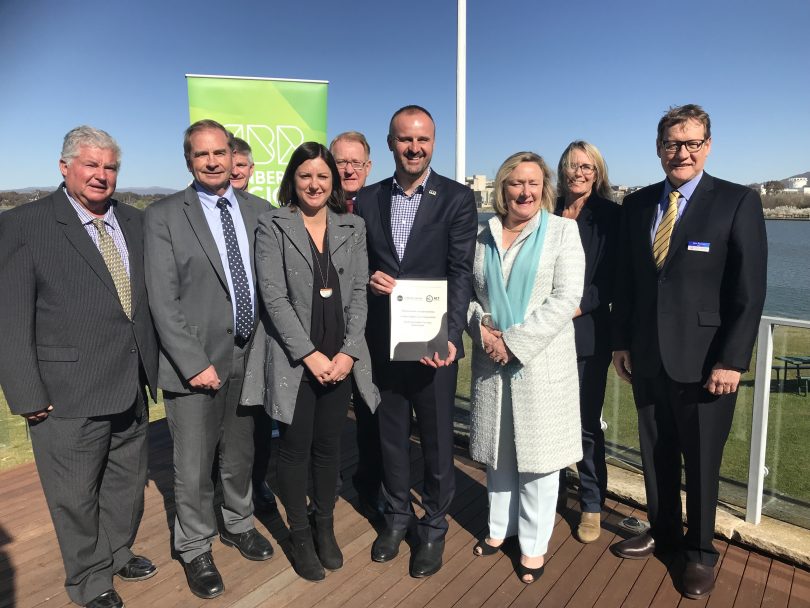
First, we were a government town. Next, a “knowledge city”. And now, according to those driving regional collaboration, Canberra could be an integral part of the agricultural economy’s future too. But will the NSW State government come to the party?
The ACT Government has just signed a new Memorandum of Understanding with the Canberra Region Joint Organisation, incorporating south-eastern local government areas.
There were celebrations at the signing around the forthcoming Raiders Centre of Excellence, which relied on support from surrounding Councils when the Macquarie St. politicians baulked at the idea of funding a cross-border project.
But the intense discussion was around how Canberra optimises the fact that “within 250km of the Lake, we are in the midst of some of the best food and fibre in Australia”, in the words of National Farmers Federation CEO Tony Mahar.
The agricultural industry lobby group says there’s clear potential to transform Canberra into a national export hub, given the airport’s capacity to shift around 120 tonnes of international freight each week. We could become, in the NFF’s words, a “Fresh Food Precinct” – a regional zone where transport, agriculture and markets come together.
Airport chief Stephen Byron agrees. The challenges in Canberra have been getting scale and having a freight handling company on the ground to make it work. South Australian firm Pakfresh is working on the latter issue, close to providing a solution for the many exporters whom Byron says approach him on an almost constant basis.
He told the meeting that while there was not much value in flying a couple of trays of oysters to Singapore or Doha, he now has commitments from meat businesses who are talking about shipping 10 tonnes per week. Ongoing supply at that level is vital in creating a viable business model.
If the airport can leverage a New Zealand connection, that gives them the potential to freight via Auckland into North and South America in the future. The ultimate goal is direct export to China.
So we have superb produce, willing producers, a new transport axis and growing capacity. The ACT Government and Councils across the region are committed to a natural alliance based on geography and our regional economy.
Even as the Badgerys Creek airport finally develops in Western Sydney, access to airports in Australia’s largest city will still be so hopelessly congested, making Canberra a far more attractive option. The potential is literally immense.
The biggest roadblock turns out to be, literally, the state of the roads. It’s about connectivity, investment in major transport routes leading somewhere other than Australia’s biggest city.
Co-chairing the meeting, Chief Minister Andrew Barr suggested that with a NSW State and Federal election in the wings, there might never be a better time to ask for what he called “enabling structure”. Put simply, it’s about getting the NSW and Federal governments to commit to funding transport across that line on the map.
Stephen Byron nominates the Barton Highway, access from the coast and the Monaro Highway as critical for agricultural freight transport. There’s some discussion about rail too: Snowy Monaro Shire president John Rooney is a fierce advocate for a re-fitted rail link between Canberra and Eden’s port.
Yass Valley mayor Rowena Abbey who chairs the CRJO believes this is “a time of unprecedented opportunity for the region”. But will a NSW State Government that’s just been through a massive by-election loss in nearby Wagga make promises that benefit Canberrans as much – or more – than their own voters?
The Chief Minister asked, “If we can do it for Rugby League, can we do it for regional freight?” It might make plenty of economic sense, but will that be enough to convince the Sydneysiders?
Original Article published by Genevieve Jacobs on the RiotACT.


What's Your Opinion?